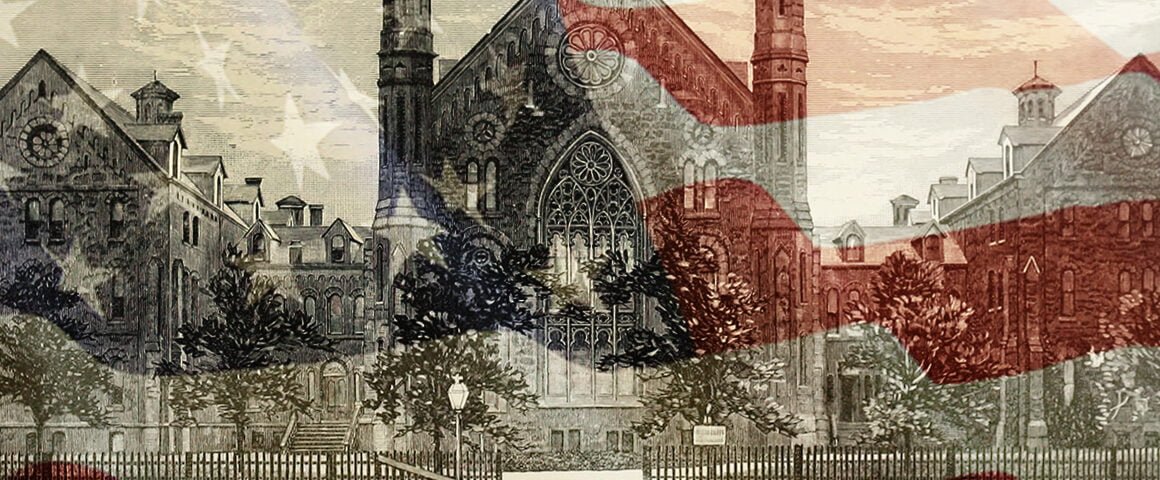Political theology is the order of the day, and my, does it make people emotional. Different tribes of Protestants denounce each other for being un-American, or theocratic, or giving away the gospel in search of power. The war is not even between denominations; even within Calvinist churches and their Baptist adjutants in the United States, the responses to Stephen Wolfe’s book on Christian nationalism varied from firm but sober dismissal, to hyperventilating fears that theocracy was just around the corner. James Clark offered a judicious review of the book at this publication, and I tried to tease out a few principles of Anglican historic commitments on political theology this past winter. Still, the debate continues, and it seems apparent to me that there remains significant disunity within the province over what political theology is and how Anglicans interact with it. My point today is not to litigate political theology, but instead to argue for a substantive commitment to Anglican churchmanship and ecclesiology, and perhaps most importantly, Anglican rhetoric. We cannot, we must not, use the taxonomy of Baptists, the Reformed, “Evangelicals”—whoever the deuce that might be—Pentecostals, Hindus, Muslims, Buddhists, Ewoks, Yoda or anyone else when we argue political theology or any other important debate. We must be Anglican, first and foremost.
The first difficulty, and one that must be acknowledged, is that fact that very few Anglicans in the Anglican Church in North America (ACNA) began life as Anglicans, or even spent their adolescence in it. Our mental habits, our piety, and our way of looking at religion usually comes from somewhere else. Even when we do find “Anglicanism” it is often the highly Americanized and vaporous “Three Streams” that turned the brains of Episcopalians—even conservative ones—into intellectual and liturgical mush. Reconciling the liturgical—or non-liturgical—dispositions of Pentecostalism, syncretic Anglo-Catholicism, and some sort of broad liberal Protestantism was always a fool’s errand. Modern Anglicans seem to think the same program will somehow work with regards to how Anglicanism is perceived in the public square and in the life of the polis, with similarly anemic results. The idea that a perpetual syncretism will gain converts isn’t actually effective. Biblicist conservative Evangelical megachurches—hardly syncretists, despite their often slapdash theological commitments—grow at rates that would make any rector envious. So it seems to me that if we’re going to take the time to be Anglicans, we should be Anglicans. There is a verse in the first chapter of the book of Ruth where the matriarch tells her mother-in-law Naomi “thy people shall be my people, and thy God my God.” That should be our disposition, no matter whether we are latter-day Edomites or Moabites or Philistines. Our people are now the Anglican people.
The Anglican people we modern-day Ruths should embrace is certainly the people we are in communion with in the global Anglican Communion. Its also those who have gone before us. Our people are the longue durée of English and Irish Protestantism, governed by bishops and prayer book worship. Those same bishops and the priests, deacons, and laymen under their charge have given us nearly 400 years of wisdom regarding the relationship between church and state, between religious and civil society. The advent of the internet has made those resources more available than ever, and—here’s an admittedly shameless plug—my Hillsdale colleague Adam Carrington and I are writing a book that will hopefully introduce ACNA parishioners to the Episcopal bishops of the Nineteenth Century to whom we owe so much of our heritage. Other rectors in the province are using homilies and social media to explain historic Anglican churchmanship and traditional Anglican commitments on politics and the church.
Reclaiming Anglican practice on religion, politics, and civil society isn’t just the work of clerics or scholars, however. We can all play our part, and one way of doing that is for Anglicans to avoid using the language of other tribes when we interact with public debate on important concepts. For those coming to Anglicanism from internet-fueled red-pilled “traditionalism,” leave throne and altar at the door. The Anglican Church in North America has neither; we have a president we pray for, and a holy table where we receive the real spiritual presence of Christ. For former Presbyterians, it’s time to throw out the slanders of theonomy every time someone doesn’t affirm “the spirituality of the church.” That’s another term you can toss, by the way. Anglican religiosity is not and has never been “merely” “spiritual.” If you’re coming from theocratic folk Calvinism, leave the populism at the door. If you’re coming from Kinism, understand that our communion is 65% black, and you will possibly submit to a godly black man as your reverend father in God someday. If you’re coming from a Trumpy Revivalist background, understand that America and the church never have been, and never will be, synonymous. If you’re a Southern Baptist, understand you’re communing in a tradition that is relatively friendly to establishmentarian political theology, and only concedes disestablishment as a prudential good, and not a biblical necessity. If you’re coming from a Lutheran background…well really just relax a bit and bring something else besides the mushroom soup you’ve already made for the potluck.
All of us who weren’t baptized or reared Anglican have “church back home” syndrome to one degree or another. That doesn’t, however, need to mean we are any less Anglican than our brothers and sisters who spent their whole lives in the Communion. What makes us Anglican is our willingness to follow Ruth’s advice, and let our new people and their tradition guide our worship, our speech, and our piety. Ruth turned away from the church back home and didn’t let it govern her any longer. So too should we.







'The Future of Anglican Political Theology' have 2 comments
August 7, 2023 @ 1:01 pm Philip Enarson
The ‘church back home’ can and does hinder new comers to being good ACNA members. But it must be said ACNA does no favors when it promotes ‘Three Stream Ecclesiology’ without explaining in detail how the ‘Three Steams’ are to function at the local parish level. Where are the successful ‘Three Stream’. Parishes? Please name three or at least one.
August 8, 2023 @ 11:41 am Ben Jefferies
Dear Miles —
This issue has been a cause of great pain to me, since it was TNAA’s choosing to run James Clark’s review that led me to cease contributing anything to TNAA, despite it being manifestly the best watering-hole (otherwise) for the kind of dialogue I am interested in.
I mostly like what you are saying here in this piece, of “Anglicans” being our people (though, it were better if you simply said “Baptized Christians are our people”), as opposed to some other line-in-the-sand between “us” and “them” — But categorically, I think your semi-irenic, let’s-clear-the-deck approach insufficiently reckons with Clark’s review of Wolfe, which you called “judicious”. Wolfe, as you know, bases his whole practical project on working for the good of those with whom you have “ethnic ties”, (together which his total spiritualizing of ‘the Church’), which in and of itself renders his project un-Christian. (As Peter Letihart also asserts in his Theopolis review, “Wolfe’s dualism truncates and so distorts the gospel.”). It is kissing-cousins with Kinism, if not (as I believe) actual outright Kinism.
For TNAA to publish a review of Wolfe is not a problem. For TNAA to publish a review of Wolfe, that *doesn’t critically mention his Kinism, and reject it as a major problem of the book*, and additionally to publish this *in the very midst of the Achord affair*, and then, to stand by so doing — this is TNAA’s way of saying “Kinism is on the table, folks”, which is a house I will not work to build up, and which, if you apply the argument you have here made, you also cannot abide. If you wanted to actually clear some ground for Anglican Political Theology (a project I am deeply interested in) it would be better to call out Clark’s review as ill-advised and insufficiently critical. Until TNAA sees this error, I will continue to have deep regrets about this online journal, which held so much promise.
Not all ideas can be friends. Treating them like they can be is of a piece with the very same milque-toast liberalism that we all rightly reject. If you think your idea is right, then you are obliged to reject Wolfe, and Clark’s silence on Wolfe’s error (actually — worse the silence. In the much-amended footnote 5 to clark’s piece, Clark takes pains to say “See, Wolfe is very clear that by “ethnic” he doesn’t mean “white”! He is absolved!”), not to call Clark’s review “judicious.”